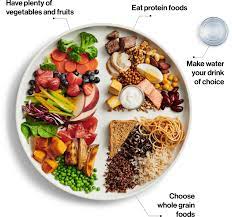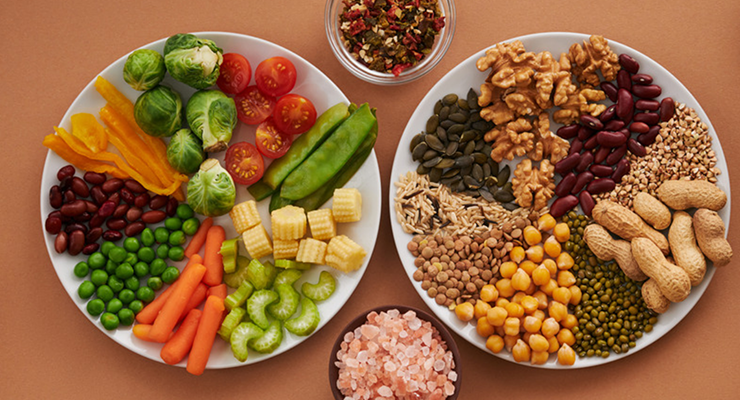
The plant-based diet has been a popular health food trend, but what is it, exactly? What are the health benefits of eating mostly plants, and how is a plant-based diet different from a vegetarian or vegan diet? Amy MacDonald, a Registered Dietitian at The Ottawa Hospital dives in to all these questions, and offers tips on how to get started with plant-based eating.
What is a plant-based diet?

A plant-based diet consists of mostly plants, but can include processed foods and animal proteins in small amounts.
At the risk of sounding obvious, plant-based diets are diets that mostly include plants. Typically, this kind of eating minimizes animal proteins, but may contain some animal protein sources such as beef, chicken, fish, eggs, cheese, cow’s milk, etc. Overall, eating plant-based means eating mostly whole foods, but can include animal proteins and processed foods in small amounts.
What are the health benefits of eating a plant-based diet?
Scientific studies suggest that adopting plant-based eating can have many health benefits. It can reduce your risk of chronic conditions like heart disease, diabetes, and cancer. It typically contains potassium and electrolytes, which can help manage blood pressure. It also tends to be higher in fibre, which supports your digestive system. For people who already have a chronic condition, adopting a plant-based eating style may help reduce the amount of medication they need to manage those conditions.
How is a plant-based diet different from a vegetarian or vegan diet?
A lot of people think that plant-based, vegetarian, and vegan diets are the same, but there are some important differences. Plant-based eating tends to be more flexible in terms of food options compared to vegetarian or vegan eating. Keep in mind that just because something is vegetarian or vegan doesn’t mean it’s healthy. Vegan diets have no animal proteins, but are not necessarily plant-based. Vegan and vegetarian diets can also include highly-processed foods like French fries and cookies, while plant-based diets tend to focus on non-processed foods. Finally, being vegan may expand from what’s on the plate into other parts of life, such as not using or wearing animal products.
Is eating a plant-based diet consistent with Canada’s Food Guide?

Canada’s Food Guide features whole grains, fruits and vegetables, and is consistent with a plant-based diet.
Yes! Canada’s Food Guide, which was updated in 2019, is, at its core, plant-based. The guide recommends that whole fruits and vegetables take up half your plate, whole grains take up one quarter, and proteins, including plant-based proteins take up one quarter.
How can I make sure I have enough protein in my plant-based diet?
There are many plant-based proteins to choose from. Try some tofu, legumes (chickpeas, beans, peas,) nuts and seeds, with every meal. You may need to take iron, B12 or other supplements to make sure your body has all the nutrients it needs. Talk to your doctor or dietitian for advice that is right for you.
How can I start eating more plant-based foods in my diet?
You don’t have to jump in to a plant-based diet with both feet. You can start by making one of these changes:
- Start with fruits, vegetables and whole grains you like, and include more of those foods in your meals and snacks.
- Try eating one meatless meal a week and slowly work your way up.
- Replace meat with a plant-based protein in recipes you already make. For example, you could put beans in your chili rather than ground beef.
- Look for opportunities to choose whole foods instead of processed food. For example, you could cook some potatoes instead of French fries.
- Try a new recipe!

To get started with plant-based eating, start with fruits and vegetables you like, and add them to more meals and snacks.
It doesn’t have to be all or nothing, and making one change at a time is ok. Dietitians at The Ottawa Hospital tend to promote including foods that will help you achieve your health goals, rather than taking less healthy foods away and labelling them as “bad.” Being too restrictive can lead to unhealthy eating behaviours and an unhealthy relationship with food. If you need help with changing your diet, talk to your family doctor or a dietitian. Need help? Find a dietitian in Ottawa.
Is eating a plant-based diet more expensive?
It doesn’t have to be! In particular, plant-based proteins tend to be more affordable than animal proteins. Dried, canned and frozen fruit and vegetables can be good alternatives to fresh. For people living with low income and/or food insecurity in Ottawa, call 2-1-1 for more information on available programs and take a look at the resources below.
Where can I access healthy food in Ottawa?
The grocery store isn’t the only place to get whole, healthy foods. In Ottawa Good Food Ottawa is a local organization dedicated to helping both people who struggle to buy food and people who want to support local food systems. On their website, you’ll find food resources for isolated seniors, a list of organizations that make take-away meals for those in need, a food link directory that includes food banks, Meals on Wheels and other community meal programs, Good Food On The Move which supplies low-cost fresh fruits and vegetables for people with food insecurity, links to local farmer’s markets, a ‘buy local’ food guide, and grocery delivery listings.

Support patient care and research at
The Ottawa Hospital
You might also like…
Bringing communities together, one stitch at a time
In celebration of June being both National Indigenous History Month and Pride Month, The Ottawa Hospital hosted a beading workshop for Indigenous and 2SLGBTQIA+ staff and their allies.
Aging well: Guidance for older adults
In this special video series for both older adults and their loved ones, geriatric care specialists from The Ottawa Hospital offer guidance on navigating common health-care challenges that may arise with aging.
How to stay safe around water this summer
Drowning can happen to anyone — even strong swimmers. Emergency physician Dr. Christian Vaillancourt debunks common myths about drowning, explains how to act quickly to save a life, and shares what you can do to keep yourself and your loved ones safe around water.
What’s the difference between an optician, optometrist, orthoptist and ophthalmologist?
“Do I need to see an optician, optometrist, orthoptist or ophthalmologist?” We asked Ophthalmologist Dr. Annick Fournier to break down each role so you will know who to consult for your specific eye care needs.
Understanding rabies: Risks, vaccination and what to do after a bite
Although rare in Canada, rabies is almost always fatal once symptoms appear. Infectious diseases expert Dr. Michaeline McGuinty shares how rabies is spread, when to get vaccinated and what to do after a bite.
“My story doesn’t have to be your story”: New screening test better at preventing cervical cancer
“I went from being a 32-year-old new mom to a cancer patient with an incurable diagnosis.” Alicia’s journey underscores the critical role of HPV testing in preventing cervical cancer. Discover how the new HPV test can save lives and find out how to book your cervical screening appointment with our “Superscreener.”


 To reset, hold the Ctrl key, then press 0.
To reset, hold the Ctrl key, then press 0.





